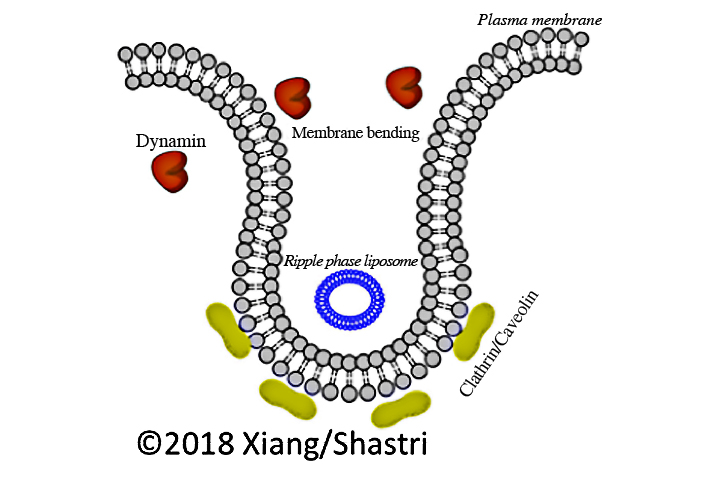Stiffness matters

Graphic: Prasad Shastri, Shengnan Xiang
Nanomedicines need to get taken up by diseased cells in order to release their cargo. Cancer cells have altered membrane properties, which hamper their ability to take up nanomedicines. A research team led by Prof. Dr. Prasad Shastri at the University of Freiburg has shown that, the stiffness of cancer cell plasma membrane affects how nanoparticles get internalized, and this process can be enhanced when the cell plasma membrane stiffness is increased. These findings are published in the scientific journal Small.
“In order to increase therapeutic effectiveness, it is critical to find general principles that can positively influence uptake of nanomedicines into cells” emphasizes Shastri. A cell swallows nanomaterial from its immediate environment via deformation of the cell membrane through a process called endocytosis.
According to Shastri, up to this point research efforts have primarily focused on how and which membrane proteins are responsible for this process. It is still relatively unclear what role the biophysical properties of cell membrane play in this process.
The Freiburg team of Shastri, Dr. Shengnan Xiang and Dr. Melika Sarem, have now discovered that liposomes – nanoscale vesicles of lipid molecules encompassing an aqueous core – can be used to alter the stiffness of the cell plasma membrane through lipid transfer.
Increasing the stiffness of cancer cell membrane enhanced the entry of polymer nanoparticles through pathways rich in cholesterol. “The results show that the biophysical properties of the cell membrane provide important starting points for further improving targeted treatment of tumor cells,” summarizes Shastri.
Prasad Shastri is the Professor of Biofunctional Macromolecular Chemistry at the Institute for Macromolecular Chemistry and the Professor of Cell Signalling Environments in the Cluster of Excellence BIOSS Centre for Biological Signalling Studies at the University of Freiburg.
Original publication:
Shengnan Xiang, Melika Sarem, Samveg Shah, and V. Prasad Shastri (2018): Liposomal Treatment of Cancer Cells Modulates Uptake Pathway of Polymeric Nanoparticles by Altering Membrane Stiffness. In: Small. doi: 10.1002/smll.201704245
Contact:
Prof. Dr. Prasad Shastri
Institute for Macromolecular Chemistry & BIOSS Centre for Biological Signalling Studies
University of Freiburg
Tel.: 0761/203-6271
E-Mail: prasad.shastri@makro.uni-freiburg.de
Email: Prasad.shastri@gmail.com
https://www.pr.uni-freiburg.de/pm-en/press-releases-2018/stiffness-matters?set_l…
Media Contact
All latest news from the category: Life Sciences and Chemistry
Articles and reports from the Life Sciences and chemistry area deal with applied and basic research into modern biology, chemistry and human medicine.
Valuable information can be found on a range of life sciences fields including bacteriology, biochemistry, bionics, bioinformatics, biophysics, biotechnology, genetics, geobotany, human biology, marine biology, microbiology, molecular biology, cellular biology, zoology, bioinorganic chemistry, microchemistry and environmental chemistry.
Newest articles

Zap Energy achieves 37-million-degree temperatures in a compact device
New publication reports record electron temperatures for a small-scale, sheared-flow-stabilized Z-pinch fusion device. In the nine decades since humans first produced fusion reactions, only a few fusion technologies have demonstrated…

Innovative microscopy demystifies metabolism of Alzheimer’s
Researchers at UC San Diego have deployed state-of-the art imaging techniques to discover the metabolism driving Alzheimer’s disease; results suggest new treatment strategies. Alzheimer’s disease causes significant problems with memory,…

A cause of immunodeficiency identified
After stroke and heart attack: Every year, between 250,000 and 300,000 people in Germany suffer from a stroke or heart attack. These patients suffer immune disturbances and are very frequently…





















